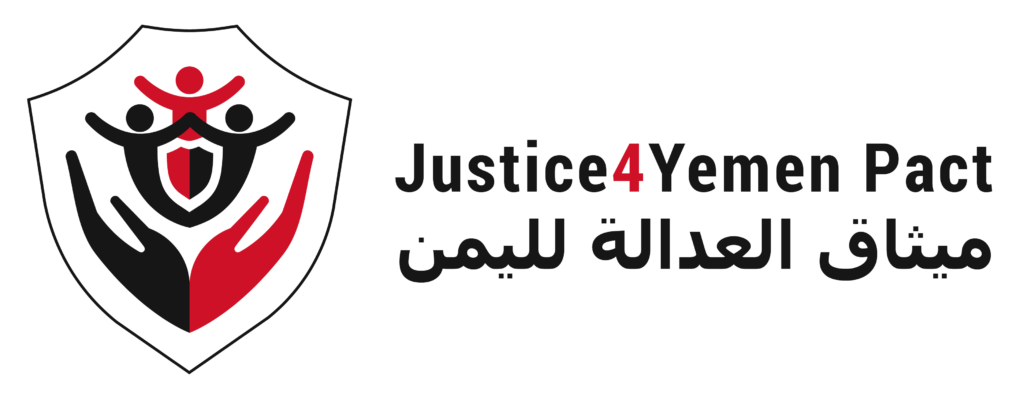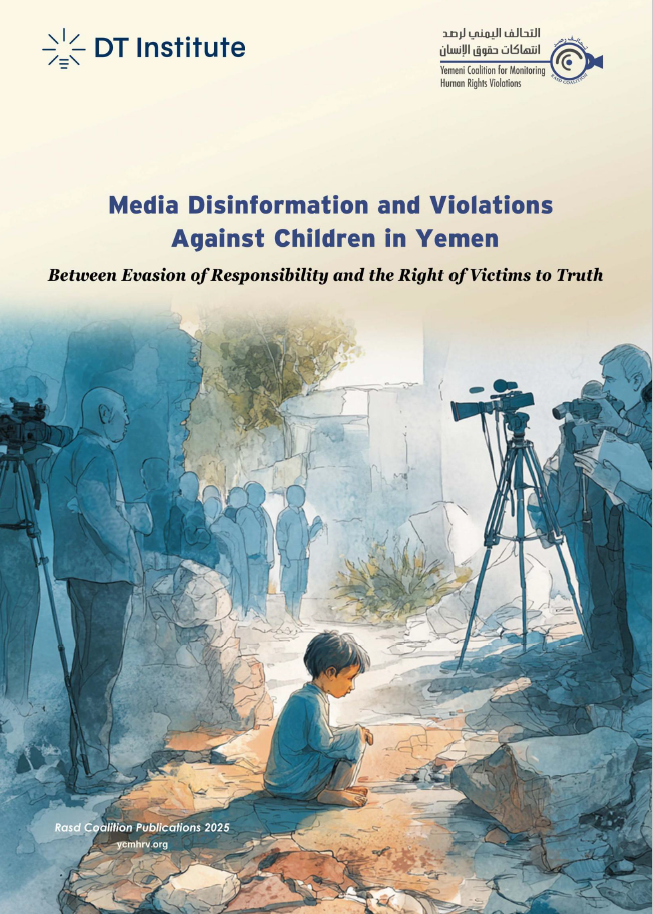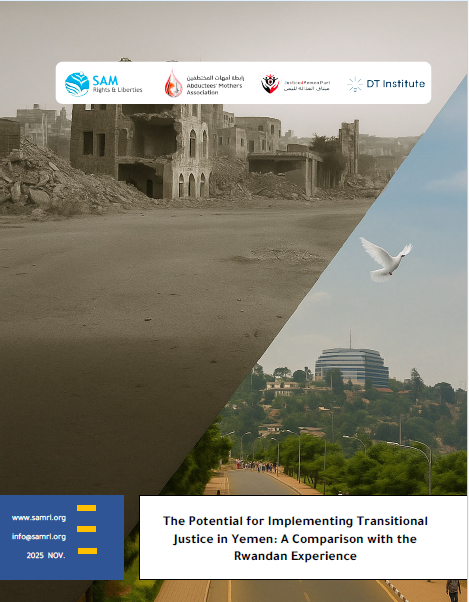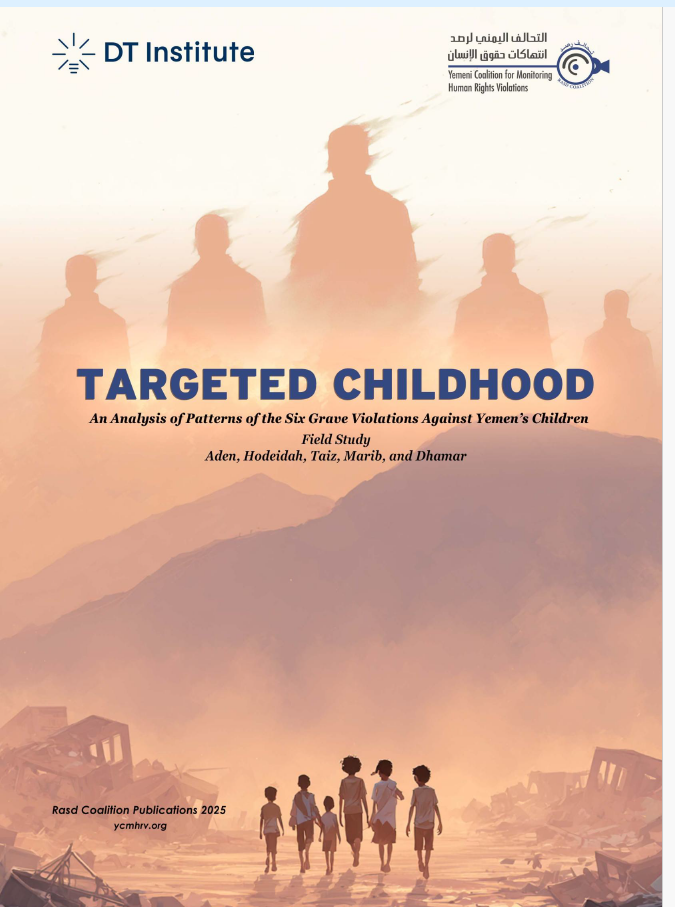1. Overview of the SPARK Program
In July 2025, the SPARK team, composed of DT Institute and its local partners, the Abductees’ Mothers Association (AMA) and SAM for Rights and Liberties (“SAM”), launched the first restorative justice (RJ) pilot initiatives in Taiz. These initiatives aim to foster reconciliation and resolve community-level public disputes that have caused human rights violations.
The RJ model was designed in response to the findings of The Path Towards Peace, a research study published by SPARK in April 2025. This study captured local understandings of transitional justice (TJ) across Yemen, revealing that 64.3 percent of community members prioritize reconciliation and war-ending efforts over retributive accountability. Participants identified clear roles for civil society: initiating dialogue and reconciliation, offering legal and financial aid to victims, raising TJ awareness, and documenting violations.
2. Initiative Spotlight: The Looted Homes Initiative
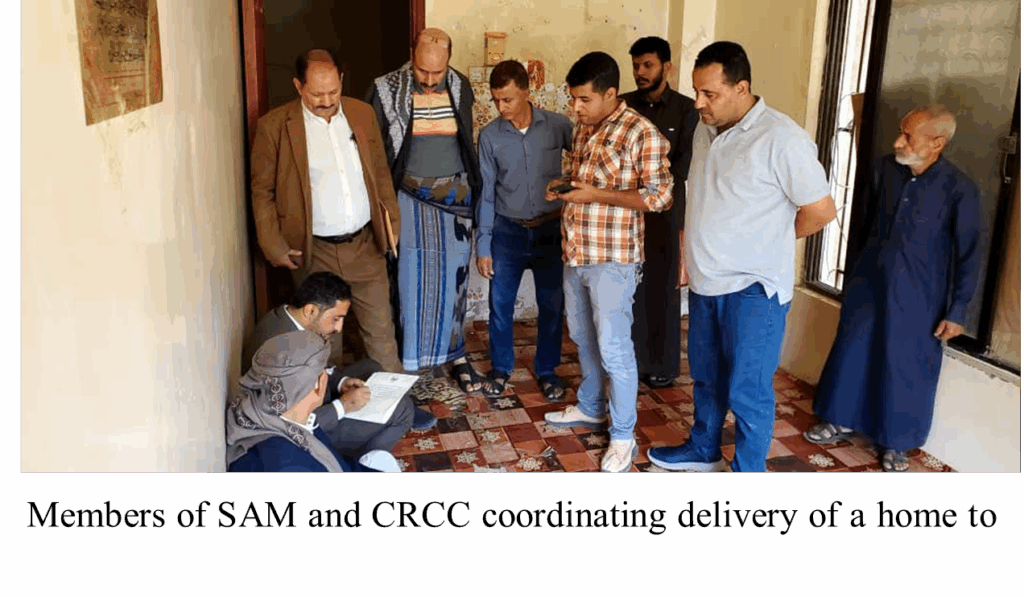
Over ten years of conflict in Yemen has left the country’s third largest city, Taiz, in complete disarray – the Houthis’ (Ansar Allah) siege has severely restricted movement in, out, and throughout the city; weak security and justice institutions have created an environment of impunity; and the war has made the city a battlefield. Residents continue to experience the negative impacts of the war, compounded by time, persistence of conflict, and intersectional violence.
Due to the ongoing violence and instability, thousands of residents have been illegally displaced from their homes, which have been looted and taken over by security forces and other actors. For Yahya Al-Matari and many others, this meant leaving the home that he had built for his family, along with all his personal belongings.
Yahya was forced from his home in the Al-Haraziyah neighborhood of the Sala district, close to the front lines and outside the weak control of the local security services. Over his many years of displacement, Yahya has attempted to return multiple times. However, the formal court system was not an option, because his home was outside the control of the legitimate authorities.
Still, Yahya sought justice for his family repeatedly through local mediations and by reaching out to al-Aqal and social figures. His attempts continually resulted in dead ends as he continued to pay rent for a home in Ibb while his own home in Taiz was occupied by others.
Yahya’s story is one of many. A Presidential Committee was even established under former President of Yemen, Abdrabbuh Mansur Hadi, to address these cases. However, this attempt was also unsuccessful. The Committee lacked the required financial resources and was further restricted by influential figures backed by the military.
3. Agreement and Impact
Under the SPARK Looted Homes Initiative, partners and the SPARK-created Community Consensus and Reconciliation Committee (CRCC) achieved what formal legal systems could not.
SPARK partners and the CRCC restored ownership of 28 homes to their rightful owners, including Yahya and his family.
💬 “As someone whose family home was once looted and later restored, I understand what that loss means. When a home is taken, it’s not just property that’s stolen; it’s dignity, memory, and the sense of belonging that binds communities together. That’s why it’s essential to activate the justice and security sectors to take the lead on addressing these violations at the national level. Our local initiative serves as a model – a symbol – to inspire and guide national authorities to take ownership of these efforts and ensure that justice reaches every community,” explainedFeras Hamdouni, Senior Program Manager, DT Institute
Reconciliation required coordinated and sustained pressure amid a complex and volatile context, wherein military-backed influencers continued to threaten every attempt to restore the houses. SPARK partners applied this pressure via their extensive local networks to pressure local decisionmakers, including the Presidential Committee, to support the restoration process.
One of the more difficult cases involved the restoration of a building consisting of 16 apartments, looted 11 years ago when a military figure occupied two apartments and prevented the owner, Mahoub al-Majdi, and residents from entering the remaining 14 apartments. They have been unable to enter their homes since.
As Moussa al-Tayyar, the building agent, recounted in the first SPARK hearing session, the numerous attempts made by him and Mahoub to regain the property. These included offers of time to evacuate, filing of formal complaints, and in-person pleas at police stations. However, their attempts were all unsuccessful, resulting in – at most – weak, half-measures by authorities before pawing the issue off to the judiciary. The judiciary similarly proved useless as witnesses were too fearful to testify.
As a result, the building has been left in despair for over 10 years. At the hearing, Moussa expressed concerns over the water and sewage networks, which may have sustained permanent damage, due to the lack of necessary repairs. Restoration of the homes was thus urgently needed, not only to return, but to ensure the maintenance and sustainability of the homes.
In addition to the authorities’ run-around and refusal to adequately evict the perpetrators, the case was further complicated by the presence of another squatter. This woman claimed to be caring for orphans and demanded ten million Rials for eviction. Due to these complications, restoration of these homes required over two months of continuous SPARK efforts.
Through these endeavors, which comprised of multiple in-person dialogues and mediation efforts with key influencers and the perpetrators, SPARK partners restored Moussa’s building and home. Perpetrators and influencers engaged included security leaders from the 22nd Military Brigade (whose soldiers were allegedly responsible for the violation), among other prominent local decisionmakers.
SPARK partners and the CRCC also coordinated with the local authority to place pressure on the perpetrators via the PLC Committee. After two weeks of sustained pressure from the Committee and other influencers engaged by SPARK partners and the CRCC, the perpetrators agreed to restore the homes and withdraw from the building.
4. Learning, Documentation, and Replication
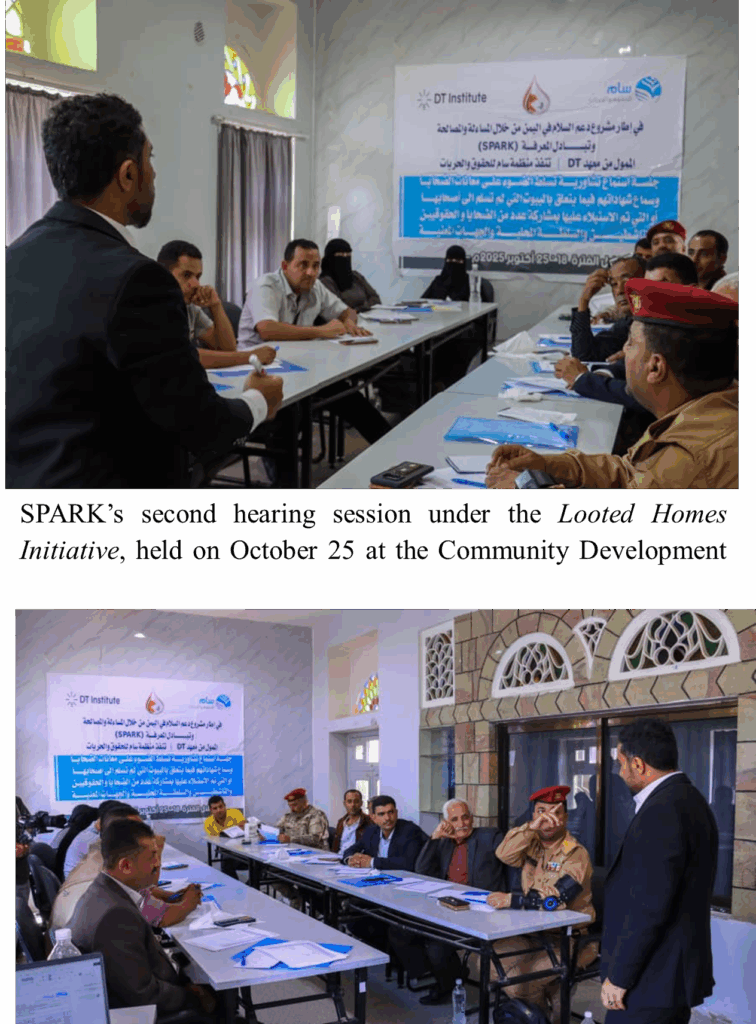
At the outset of this initiative, the SPARK and CRCC team worked to document all the looted homes within Taiz. By conducting field visits, interviewing residents and community members, and verifying local ownership through records, the team compiled a database of over 320 homes. The database included crucial information to address the lootings, including the relevant perpetrators, controlling authority, and other pertinent details.
From there, SPARK partners and the CRCC leveraged their extensive networks to engage local authorities, influential social and human rights figures, and the community members whose homes were looted and remain occupied. They engaged these figures in two hearing sessions, attended by 35 participants, including victims, representatives from the local authority and security services, judges, legal figures, human rights defenders, activists, and media professionals.
To stimulate discussion and ensure participants engage in productive conversation, SPARK partners prepared two reports, providing updates on the looted homes documented. The reports also provided analysis of violation patterns, root causes, and psychological impacts upon victims.
In the first hearing session, the SPARK facilitator utilized the report to draw attention to the hundreds of cases of looted homes throughout Taiz. These included cases where looted and eviction of rightful homeowners was conducted illegally and for no reason as the homes are located outside of conflict zones. The facilitator also highlighted the inaction and outright refusal of the authorities in many cases to enforce eviction orders.
From there, the participants launched into a robust discussion. Judge Muammar Hammoud placed the blame upon Article 27, which he stated was where the main legal problem lies. This law places the onus on victims to initiate legal processes to restore their homes. For these reasons, he stressed that resolutions must begin with administrative decisions issued by the local authority, while also noting the need to balance public interest with ensuring the rights of individuals are not infringed.
The Director for Security Affairs for Aqal (Community Leaders) similarly placed the blame on the law, stressing that a case is not legal until a homeowner files a complaint preventing action in some cases. He further explained that in cases where judicial orders were present, implementation did not go smoothly.
This was not enough for the participants, who echoed Judge Muammar’s call for local authority action and expressed strong need for the SPARK initiative. Local community activist, Safaa Fadel, drew attention to the insults and discrimination faced by homeowners in attempting to claim their legal rights. She stressed that this reality requires the intervention of civil society action, such as the SPARK initiative, to overcome these obstacles and actualize the homeowners’ rights.
💬 “We have to admit that there is a problem. There are cases of seizures and exhaustion, and I have personally taken out more than three or four houses through the [SPARK] initiative,” stated Qasim Ali Ibrahim, Director of Media and Relations in Taiz, in an attempt to persuade government institutions to take accountability and address the issues.
Safaa further pointed out that houses within firing lines and inhabited by unpaid military personnel require local authority intervention and assumption of responsibility to remove. This prompted further discussion on the war and its exacerbating effects upon community members. At the end of the discussion, participants agreed on the importance of documentation (even listing the information to be collected for each case) and the need for an up-to-date database.
SPARK partners notified participants that they were already developing such a database and collecting the required information. Participants expressed support and agreed to continue coordination in the second meeting. In the second meeting, the facilitator utilized the report to provide an update on the cases addressed and those facing additional difficulties to be worked out within the session. During the discussion, Director General of the Human Rights Office, Ali Sarhan, implored participants to champion the transitional justice principles requiring balance between accountability and reconciliation.
The Director General noted that Taiz is at a critical stage, which requires patience and cooperation from everyone. Rather than holding the local authority fully responsible, he called on all parties to support the state’s efforts to restore rights and repair the situation. By the end of the discussion, participants who were previously disengaged were amendable to the SPARK partners’ requests on behalf of the homeowners.
💬 “What happened today in the session made me more convinced to communicate with the owner of the house. In the presence of the committee, I will hand over the building,” stated one perpetrator, who had been occupying the home and apartment building of Al-Lahbi for approximately three years, but agreed to attention the hearing session upon invitation and insistence of the SPARK partners.
Lieutenant General Waheeb Al-Houry expressed his readiness to work with local civil society in evacuating looted homes and delivering orders and warnings to those in violation of official orders.
To further empower the displaced community members, partners leveraged the media to demand the attention of the local authorities and other powerful figures with the ability to influence mediation outcomes. The initiative generated local and national attention with coverage from over four media outlets, including Yemen Future and Al Shab TV. Outlets broadcasted the initiative on their social media platforms, which maintain a combined total of over 729,000 followers.
Taiz Time and the Our Story (Qisatina) Platform posted videos covering the initiative and documenting one of the hearing sessions in detail, including through engagement with participants. SPARK partners are also preparing two of victims’ stories and a video to further amplify the voices of both the individual and collective victims of these violations, who remain displaced due to the widespread looting and conflict.
5. Scaling the Impact
The urgent need for additional restorative justice pilots is clear: these initiatives play a critical role in easing local unrest, bridging social divides, and laying the groundwork for sustainable peace. Equally urgent is the broader need for transitional justice . After more than a decade of failed national peace talks, victim-centered approaches like restorative justice pilots represent a new path forward.
“SPARK partners did what existing local dispute resolution mechanisms – tribal systems, the judiciary, local authorities – could not – even in the face of such an urgent issue impacting a significant portion of the city’s population,” stated DT Program Officer, Lynn Arbid, “This signals an urgent need for restructuring of these systems, not just locally, but nationally – as we know Taiz is not unique in these issues. Our victim-led reconciliation initiatives provide a blueprint for community ownership of sustainable, successful dispute resolution practices that can be replicated across the country.”
By demonstrating reconciliation at the community level, restorative justice initiatives operationalize transitional justice principles, educating stakeholders, building trust, and fostering shared frameworks for conflict resolution. These pilots serve as blueprints for future transitional justice efforts, rooted in local ownership, dignity, and dialogue.

